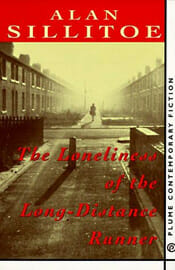Dusted Off: Alan Sillitoe’s…

Dusted Off: Alan Sillitoe’s The Loneliness of the Long-Distance Runner
Nine teacups. Hold the tempests. Serve bitter, cold
Film noir is the anti-hero Disney World. Here, Place is the greatest character of all. The cigarette-sucking mug of Robert Mitchum and the smolder of Veronica Lake succeed best when acted (or reacted?) against the soliloquies of cracked sidewalks and dark shadows.
Book noir, to my taste, gives us even more. One of the genre’s best examples, Alan Sillitoe’s 1959 collection, The Loneliness of the Long-Distance Runner, is comprised of nine stories set in bleak Nottingham among prisons and factories. Here, everyday characters cling desperately to personal codes heavy as millstones.
Place always matters. The bogs of English birth and class and even geography suck at the shoes of Sillitoe’s unheroes at every step—even for those who run like the wind.
-

-

-

-

-

-

-

-

-

-

-

-

-

-

-

-

-

-

-

-

-

-

-

-

-

-

-

-

-

-

-

-

-

-

-

-

-

-

-

-








































